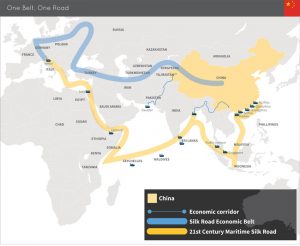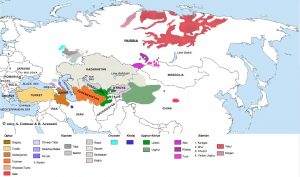Toronto, September 21, 2021: The following report, compiled by K.M. Greg Sarkissian, provides a summary of recent discussions surrounding the geopolitical rivalry between the United States and China, and the impact it has on both Western interests and small nations of Eastern Europe and Asia.
The content of this article solely reflects the observations of the reporter, on the discussions had, and does not represent the official position of the Zoryan Institute.
Challenges of China vs. United States
We are continuously bombarded with news about the challenges that China poses to the United States and other Western nations. They include:
- The U.S. dependence on China’s low-cost goods that enable income-constrained consumers to make ends meet.
- China’s illegal method of acquiring Western innovation and intellectual property which may be detrimental to U.S. economic interests.
- U.S. reliance on Chinese markets to sell its manufactured goods, however Chinese labour laws and policies have become detrimental to the competitiveness of the United States and Western nations.
- The U.S. dependence on China to support its own exports, while utilizing Chinese made components for its own manufactured goods.
- China’s support of U.S. federal debt as the largest foreign holder of U.S. Treasury securities.
- The New Development Bank (NDB) comprised of the five equal partner nations of Brazil, Russia, India, China, and South Africa, with headquarters in Shanghai, China, is challenging the dominance of the World Bank. The NDB with its sizable capital and its financing of infrastructure and sustainable development projects, is competing with the World Bank.
- China leads the world in the development and use of artificial intelligence.
- China’s military is twice the size of the U.S. military, at almost 3 million strong and growing. It ranks among the world’s leading militaries in anti-ship ballistic missiles.
- China has plans to dominate the Asia-Pacific region and the South China Sea.
Based on these points raised, it appears that while there is a definite economic interdependence between the two countries, China poses major economic and military challenges to the U.S. and its Western allies. China has expanded its markets in Asia, Africa, and even into Latin America, the backyard of the United States. China’s space program has also taken a huge leap forward by recently expanding its capability to explore the entire solar system; China is now the second nation in the world to land successfully on Mars.
The Magnitude of Russia’s Challenges to the United States
In contrast to China, the discussants explored how Russia does not pose the same magnitude of challenges to the United States and other Western nations. Russia has lost the arms race against the United States and does not have the ability to challenge its economic and trade interests. Nevertheless, the U.S. and its Western allies are confronted by Russia’s aggressive geopolitical expansions, particularly in the former Soviet republics, such as Russia’s invasion of Georgia, the loss of latter’s territories of Abkhazia and Ossetia (Russian client states), and its annexation of Crimea in the Ukraine.
In response to these aggressive expansions, and for hacking American government agencies and the nation’s largest companies, and for the poisoning of Russia’s dissidents on European (British) soil, the United States imposed extensive sanctions on Russia. These sanctions intended to make it more difficult for Russia to take part in the global economy and to deter Russia in its continued campaign of disruptive actions in cyberspace and altering of borders by force in Georgia and Ukraine.
With these sanctions in place, the question was raised if Western nations are indeed pushing Russia towards China, given the common regional interest between China and Russia: China is overly concerned with the United States’ presence in South China Sea, allegedly controlling the waterways in the region, and Russia is disturbed by the US-NATO expansion to its borders via the Baltic states.
Russia’s Concerns in Regards to China
Some concerned with China’s rise to super-power status, highlighted the fact that Russia may have its own concerns with regards to China, despite their common resentment of U.S. hegemony in the South China Sea, or NATO’s expansion into Eastern European and Baltic states. The following points were pointed out:
- Russia is wary of potential Chinese expansion to the West, especially to the territories which Russia was able to conquer and annex from China in the 1860s through the Beijing Treaty (resource rich Siberia, East of the Ural Mountains). During that time, the Qing dynasty had been weakened by the challenges faced in the North by the Russian Empire, and in the South by the British, with the latter forming a foothold in Hong Kong.
- The land annexed by Russia under the Beijing Treaty is so immense that it constitutes over 75% of the Russian land mass of today, which is about 12.13 million km2, or three times the size of the European Union.
- Comparing 1.45 billion Chinese people to Russia’s 145 million population, indicates a ratio of 10 to 1. This ratio is especially critical for Russia, given that its population is continuously shrinking.
- China’s attempt to reclaim its former territories of only 150 years ago would provide the nation room to expand and to accommodate its large and ever-growing population.
- Russia’s deep dependence on China to purchase Russian raw materials and energy may hinder Russia’s ability to develop its own capacity to add value to its raw materials before exporting it to China.
It was noted that there may be reasons why China does not expand to its former territories in Russia. While China’s power is now on the rise, it may not yet feel strong enough militarily to challenge Russia. The discussant referred to the undeclared Sino-Soviet military border conflict of 1969 and its aftermath, where – treaties were signed, and peace was returned to the region, however these skirmishes led to a split between the two communist regimes. It was also highlighted, that at the time of these agreements, the Soviet Union was intact, and China was not yet on its way to becoming an economic and military superpower. A further restraining factor may be the potential for nuclear war between these neighbouring states.
It was concluded that the current partnership between Russia and China could be a matter of convenience; both nations are working together to overcome Western competition and their concerns of Western hegemony. However, as China gains strength and the Russian population continues to shrink, will China continue to pursue the same course of action?
China’s Geopolitical and Economic Motivations Behind the Silk Road vs. Western Interests
The discussant focused on the Chinese initiative of the “Silk road” and its motivation. China is vigorously ascending to super-power status and aggressively pursuing the expansion of its Silk Road 2.0, The Belt and Road Initiative, to Europe, across Eurasia and the Indian Ocean (See the map below).

© Lowy Institute
According to the Council on Foreign Relations:
“China has both geopolitical and economic motivations behind the initiative. President Xi has promoted a vision of a more assertive China, while slowing growth and rocky relations with the USA have pressured the country’s leadership to open new markets for its goods.”
It was further underlined that in order for China to achieve its global economic and geopolitical objectives, it would need strategic partners to facilitate westward expansion.
Common Geopolitical Interests of Turkey and China
China may find Turkey and Turkic speaking nations of Central Asia as natural allies. It was underlined that both Turkey and China pursue expansionary objectives of their territories to strengthen their influence in the world. While China seeks to develop the Silk Road trade routes to Europe, Turkey, in alignment with the Turkic speaking nations, wishes to extend its influence from the Balkans to the Chinese province of Xinjiang. Throughout these regions, Turkey is appealing to the cultural and the religious kinship of the Turkic speaking people of Central Asia, Russia, and Turkmens of the Middle East, to serve its global objectives of “Turkification” and its influence as a major power.
With eastward expansion, Turkey could engulf all Central Asian Turkic speaking republics which would facilitate the implementation of China’s Belt and Road Initiative throughout the region. This initiative incorporates the area extending from Western Turkey to Azerbaijan, continuing through Turkmenistan, Kazakhstan, Kyrgyzstan, Uzbekistan, and other Turkic speaking people of the Russian Federation (approximately 13 million). The discussants also stressed how the eastward expansion of Turkey’s power could be particularly detrimental to Russia in the long run when one takes Yakutia, a Turkic-speaking territory covering a large area of northeastern Siberia, into consideration. See map below.

© Alejandro Gutman & Beatriz Avanzati
A Shift in Turkey’s Policy Towards its Neighbours
It was noted that in 2014, the official declared policy of Turkey was to not have any conflict with its neighbours. Since then, this policy seems to have been abandoned and a new policy of expansion has been led by the President of Turkey, Recep Tayyip Erdogan, and his AKB Party, in collaboration with other nationalist parties.
Moreover, starting in 2014, Turkey has been militarily engaged in Syria, Iraq and recently Libya, and has generated tension with Greece, Cyprus, Egypt and France over the Eastern Mediterranean maritime boundaries of potential energy resources. It is possible that Turkey may fully activate the S 400 air defense system, purchased from Russia, compromising its strategic relationship with NATO and United States.
Turkey’s Relationship at Odds with NATO and Western Liberal Democracies
Turkey’s relations with the United States and Europe have been steadily deteriorating for almost a decade due to a series of serious policy disagreements between Washington and Ankara. It was agreed that these disagreements are rooted in President Erdoğan’s efforts to pursue more assertive and independent foreign defense policies. Not only has Erdoğan’s Turkey militarily intervened in the Middle East, North Africa, and the Caucasus, it has also established military bases in Qatar and Somalia, and has exacerbated its long-standing occupation of Northern Cyprus by declaring the need for a two-state solution. Furthermore, Turkey used its domestic defense production of armed drones, together with U.S. made war planes, in the recent September 2020 war in Nagorno-Karabakh. This support helped its close ally, Azerbaijan, reclaim disputed territories from their mutual rival, Armenia without any consideration of Western interests. In this respect, as one discussant notes:
“Turkish and Chinese joint interests have pushed Erdogan to flex his muscles, must notably in Cypress, and with Azerbaijan versus Armenia. Turkey seems to be going all over the place, not only in central Asia, but to places such as Cypress, the Mediterranean Sea, with potential clashes with Greece and France. Even Iran, a fellow Muslim nation, has become nervous by the Sunni encirclement and by a solid Turkic belt to Iran’s north.”
In addition to providing strong political and military support to Azerbaijan during the war, Turkey supplied Syrian mercenaries and Turkish Special Forces, in the Caucusus to the dismay of the Kremlin. This involvement greatly impacted Russia’s dominance in the South Caucasus and seriously compromised the Russian alliance with Armenia. Whereas, for Turkey, this was one of the most critical and initial strategic steps towards its planned expansion eastward, and toward the Turkic nations of Central Asia.
Turkey’s Justification for its Actions & Rapprochement with China
Erdoğan and his supporters emphasize that these are necessary and proper steps to restore Turkey to what they deem is its rightful place as a dominant regional player and major global power. In this respect, Turkish Foreign Minister Mevlüt Cavuşoğlu expressed this sentiment by stating:
“Turkey doesn’t have to choose between Russia or any others. And we don’t see our relations with Russia as an alternative to our relations with others. And nobody, neither West nor Russia, should or can ask us to choose.”
The Turkish government’s vision to expand its influence eastward, would adversely impact the interests of both Russia and Western nations. It was observed that Turkey’s expansion to the east, would result in the containment of Russia from the east by China, the South by the Turkic Republics, and the West by Ukraine, supported by Turkey. It was further highlighted that an alliance between Turkey and China could also expedite China’s expansion of its Silk Road to the West.
The Council on Foreign Relations, reflecting on the Silk Road Inititative stated:
“The Belt and Road initiative, Chinese president Xi Jinping’s signature of foreign policy undertaking and the world’s largest infrastructure program, poses a significant challenge to US economic, political, climate change, security, and global health interests.”
Other Considerations for Turkey’s Alliance with China
Erdogan’s authoritarian rule and actions against “dissidents” of Turkey, was not well received in the west, and sanctions were placed on Turkey as a result. Turkey, in order to deal with this challenge, had to change its focus to China, and get into its good graces. For example, after accusing China of genocide against the Turkic speaking Uyghur’s in 2012, the Turkish government under President Erdogan, started to suppress their own Uyghur population residing in Turkey, by arresting people by the hundreds, and deporting many of them back to China. This was particularly supported by Dogu Perincek the head of Turkey’s left-wing patriotic party, who was indicted by Erdogan’s government for 5 times life imprisonment. He went as far as comparing the Uyghurs of China to Kurdish militants in Turkey and even lauded Beijing’s treatment of the Uyghurs.
The discussants also underscored the economic reasons behind Turkey’s friendly relationship with China. China extended $3.6 billion loan facility to Turkey in 2018, and $1 million cash to Ankara in 2019, to stabilize its faltering economy. By 2020, China also officially became Turkey’s biggest importer.
Should the West Consider Russia as an Ally in Response to the growing Sino-Turkish Alliance?
One of the participants had this to say about the US-Russian future relationship:
“…U.S. policy should be less Russo-phobic, as the West had once allied with Russia against Nazism.”
This was further emphasized by noting:
“…the shared Western culture with Russia. Russian literature and art are a big factor in Western culture – their music, ballet, Dostoevsky, Tolstoy, and Tchaikovsky’s Nutcracker are just a few examples.”
This isn’t to say that the other side of the coin wasn’t also discussed. Russia has also been trying to reclaim parts of the old Soviet Union and extend its power to the Middle East or Eastern Europe.
No one considered Russia as the perfect ally, as the West has already seen how Russia reacted to the aspiration of shared values by Ukraine and Georgia with NATO, and the cost that these nations paid, with the loss of their territories.
This idea was countered by another discussant, who added that:
“Ukraine overestimated its ability to divorce from Russia, as neither EU or NATO membership is readily attainable, and Georgian violence was emanated from internal conflicts between two autonomous Republics of Georgia, namely the Abkhazia and Ossetia.”
Is India a Key Consideration for United States Strategies in the Indo-Pacific Region?
It was proposed that another key consideration for the United States, to counter Chinese geopolitical expansion, is India. This was explained by the sudden rise of Chinese assertiveness in the region and the deadly border clashes between China and India in the Galwan River Valley are jeopardizing the Sino-Indian relationship. It was here noted that U.S.-India defense cooperation has reached new heights. According to former U.S. Defense Secretary James Mattis:
“Relationships with our Pacific and Indian Ocean allies and partners have proven critical to maintaining regional stability…In recognition of the increasing connectivity between the Indian and Pacific Oceans, today we rename the U.S. Pacific Command to U.S. Indo-Pacific Command.”
Furthermore, as late as May 28, 2021 , U.S. Secretary of State, Antony J. Blinken, reaffirmed the U.S.’ special relationship with India, stating:
“The United States and India are working together on so many of the most important challenges of our time and ones that are having a profound impact on the lives of our citizens. The partnership between the United States and India is vital, it’s strong, and it’s increasingly productive.”
It was agreed that both comments were a clear indication of the depth of U.S. support for India’s emergence as a leading global power and regional partner.
According to the U.S. State Department, the world’s economic center of gravity is shifting to the Indo-Pacific region. By 2050 India is expected to grow into the second largest economic power. With this in mind, the United States has chosen India as a reliable partner on the world stage. This partnership with the U.S. will help India build its security capabilities and jointly maintain maritime interests in the world’s largest waterways of the Indo-Pacific basin. India and the U.S. will include other nations of the region in this alliance, such as Japan and Australia, to maintain access to open and secured land, sea, and cyberspace.
India as Bridge to Russia-United States Relationship
India and Russia’s strong strategic, military, economic and diplomatic relationship during the Soviet Era was also touched upon. In fact it was underscored that, after the dissolution of the USSR, Russia and India continued their close relationship, defining it as a “Special and Privileged Strategic Partnership.” This relationship has been reaffirmed by respective leaders of India and Russia, Prime Minister Narendra Modi and President Vladimir Putin, at a joint meeting in Sochi, in 2018 . The two countries set an economic target of $30 billion USD in bilateral trade by 2025.
India is already the second largest buyer for the Russian defense industry. In the wake of the conflict between China and India in the Himalayas, one underscored how Russia agreed to India’s request of expediting the S-400 air defense system and accelerating contract negotiations for the delivery of MiG-29 and Su-30 fighter jets.
Conclusion
The following conclusions were drawn at the end of the discussion:
- The Sino-Turkey alliance will need to be analyzed carefully when assessing Turkey’s relationship with the United States and NATO.
- Turkey’s aggressive attempts to redraw the regional order must be flatly rejected by its NATO allies.
- If Turkey succeeds in its expansion eastward, it would be detrimental to western interests. Several small countries in the Balkans and Eastern Europe, countries like Georgia and Armenia in the Caucasus, Syria, Iraq, Kurdistan and Lebanon in the Middle East, and Cyprus and Greece in the Mediterranean and Aegean Seas respectively, would be adversely effected.
- With both India and the United States having conflict with China on one hand, and having a good relationship with both Russia and the United States on the other, India could broker a relationship between the United States and Russia, as allies in the Indo-Pacific region.
Fascinating diplomacy awaits ahead!




